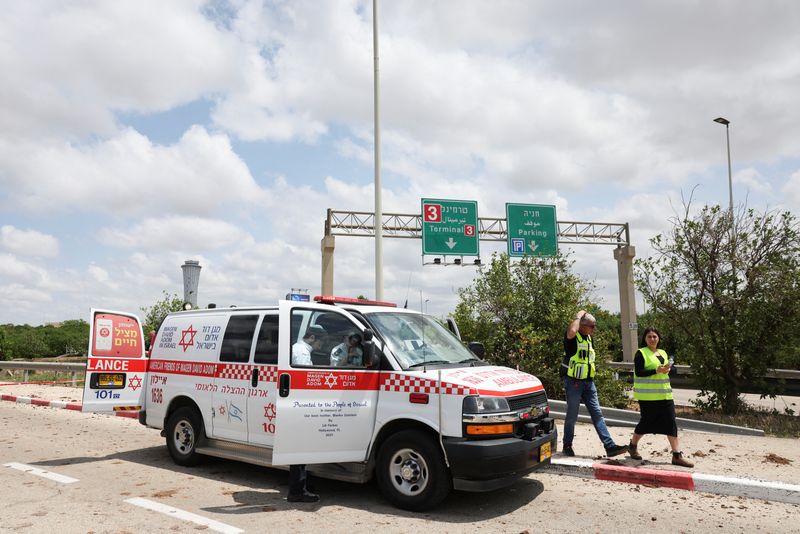Houthi Missile Lands Near Israel’s Ben Gurion Airport, Disrupting Operations
Incident Overview
On May 4, 2025, a ballistic missile fired by Yemen’s Iran-backed Houthi rebels landed near Ben Gurion International Airport, Israel’s primary aviation hub, located between Tel Aviv and Jerusalem. The missile, identified by the Houthis as a “Palestine-2” hypersonic ballistic missile, evaded Israel’s multilayered air defense systems, including the Arrow interceptor and the U.S.-deployed THAAD system, marking a significant security breach. The strike caused a plume of black smoke, triggered air raid sirens across central Israel, and sent passengers at the airport scrambling for safe rooms.
Impact and Damage
The missile struck near a road by Terminal 3’s parking lot, creating a crater “tens of meters” wide and deep, according to Senior Israeli Police Commander Yair Hetzroni. Debris damaged a road and a vehicle, but no aircraft or critical infrastructure were hit. Eight people were injured, including a man with mild to moderate limb injuries, two women with minor head injuries, and others hurt while rushing to shelters. No fatalities were reported.
Flight operations were halted for approximately 30 minutes, with some flights by airlines like Air India, Lufthansa, and Wizz Air canceled, and others, including routes to Newark and JFK, delayed by about 90 minutes. Train services to the airport were also temporarily suspended, and access roads were briefly closed. Operations resumed within an hour, though several foreign airlines, including Air France and Austrian Airlines, suspended flights to Tel Aviv for up to 48 hours.
Houthi Claims and Motives
Houthi military spokesperson Yahya Saree claimed responsibility in a televised statement, declaring Ben Gurion Airport “no longer safe for air travel” until Israel ends its military operations in Gaza. The group, which controls much of Yemen, stated the attack was in solidarity with Palestinians amid Israel’s resumed offensive in Gaza following a collapsed ceasefire in March 2025. The Houthis have intensified missile and drone attacks on Israel since late 2023, with this strike marking their fifth claimed assault on Ben Gurion in recent months. They assert their hypersonic missiles, with a range of 2,150 km and speeds up to Mach 16, possess stealth capabilities that challenge Israel’s defenses.
Israeli Response and Investigation
The Israel Defense Forces (IDF) confirmed multiple interception attempts failed and launched an investigation into the defense system’s shortcomings. The IDF noted that most Houthi missiles—over 220 launched since October 2023—have been intercepted, with a notable exception being a December 2024 strike on Tel Aviv that injured over a dozen people. Israeli Defense Minister Israel Katz vowed severe retaliation, stating, “Whoever attacks us, we will hit back sevenfold.” Prime Minister Benjamin Netanyahu convened security meetings to discuss potential responses, including direct strikes on Houthi targets in Yemen, though Israel has largely deferred to U.S.-led operations against the group.
Regional Context
The attack coincides with heightened regional tensions. Israel’s military operations in Gaza, which resumed in March 2025 after a two-month truce, have killed over 50,000 Palestinians, according to Gaza’s Hamas-run health ministry. The Houthis, part of Iran’s “Axis of Resistance” alongside Hamas and Hezbollah, have also targeted U.S. warships and Red Sea shipping, prompting U.S. airstrikes on Yemen that have killed hundreds since March 15, 2025. U.S. President Donald Trump has warned Iran, which supports the Houthis, of “dire consequences” for continued attacks.
Posts on X reflect mixed sentiment, with some praising the Houthis’ ability to bypass Israel’s defenses and others condemning the attack as terrorism. One unverified post claimed the missile targeted aircraft on the runway, but no evidence supports this.
Broader Implications
The strike underscores the Houthis’ growing capability to project power over 2,000 miles and exposes vulnerabilities in Israel’s air defense systems, raising concerns about the security of critical infrastructure. As Israel weighs retaliation and the U.S. continues its campaign against the Houthis, the incident risks further escalating the regional conflict, with potential repercussions for global trade and aviation.
For updates, monitor Reuters, Al Jazeera, or the IDF’s official channels.
